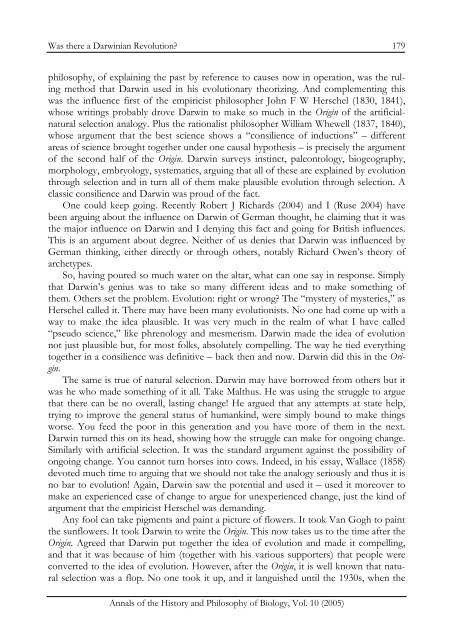Annals of the History and Philosophy of Biology
Annals of the History and Philosophy of Biology
Annals of the History and Philosophy of Biology
You also want an ePaper? Increase the reach of your titles
YUMPU automatically turns print PDFs into web optimized ePapers that Google loves.
Was <strong>the</strong>re a Darwinian Revolution?<br />
philosophy, <strong>of</strong> explaining <strong>the</strong> past by reference to causes now in operation, was <strong>the</strong> ruling<br />
method that Darwin used in his evolutionary <strong>the</strong>orizing. And complementing this<br />
was <strong>the</strong> influence first <strong>of</strong> <strong>the</strong> empiricist philosopher John F W Herschel (1830, 1841),<br />
whose writings probably drove Darwin to make so much in <strong>the</strong> Origin <strong>of</strong> <strong>the</strong> artificialnatural<br />
selection analogy. Plus <strong>the</strong> rationalist philosopher William Whewell (1837, 1840),<br />
whose argument that <strong>the</strong> best science shows a “consilience <strong>of</strong> inductions” – different<br />
areas <strong>of</strong> science brought toge<strong>the</strong>r under one causal hypo<strong>the</strong>sis – is precisely <strong>the</strong> argument<br />
<strong>of</strong> <strong>the</strong> second half <strong>of</strong> <strong>the</strong> Origin. Darwin surveys instinct, paleontology, biogeography,<br />
morphology, embryology, systematics, arguing that all <strong>of</strong> <strong>the</strong>se are explained by evolution<br />
through selection <strong>and</strong> in turn all <strong>of</strong> <strong>the</strong>m make plausible evolution through selection. A<br />
classic consilience <strong>and</strong> Darwin was proud <strong>of</strong> <strong>the</strong> fact.<br />
One could keep going. Recently Robert J Richards (2004) <strong>and</strong> I (Ruse 2004) have<br />
been arguing about <strong>the</strong> influence on Darwin <strong>of</strong> German thought, he claiming that it was<br />
<strong>the</strong> major influence on Darwin <strong>and</strong> I denying this fact <strong>and</strong> going for British influences.<br />
This is an argument about degree. Nei<strong>the</strong>r <strong>of</strong> us denies that Darwin was influenced by<br />
German thinking, ei<strong>the</strong>r directly or through o<strong>the</strong>rs, notably Richard Owen’s <strong>the</strong>ory <strong>of</strong><br />
archetypes.<br />
So, having poured so much water on <strong>the</strong> altar, what can one say in response. Simply<br />
that Darwin’s genius was to take so many different ideas <strong>and</strong> to make something <strong>of</strong><br />
<strong>the</strong>m. O<strong>the</strong>rs set <strong>the</strong> problem. Evolution: right or wrong? The “mystery <strong>of</strong> mysteries,” as<br />
Herschel called it. There may have been many evolutionists. No one had come up with a<br />
way to make <strong>the</strong> idea plausible. It was very much in <strong>the</strong> realm <strong>of</strong> what I have called<br />
“pseudo science,” like phrenology <strong>and</strong> mesmerism. Darwin made <strong>the</strong> idea <strong>of</strong> evolution<br />
not just plausible but, for most folks, absolutely compelling. The way he tied everything<br />
toge<strong>the</strong>r in a consilience was definitive – back <strong>the</strong>n <strong>and</strong> now. Darwin did this in <strong>the</strong> Origin.<br />
The same is true <strong>of</strong> natural selection. Darwin may have borrowed from o<strong>the</strong>rs but it<br />
was he who made something <strong>of</strong> it all. Take Malthus. He was using <strong>the</strong> struggle to argue<br />
that <strong>the</strong>re can be no overall, lasting change! He argued that any attempts at state help,<br />
trying to improve <strong>the</strong> general status <strong>of</strong> humankind, were simply bound to make things<br />
worse. You feed <strong>the</strong> poor in this generation <strong>and</strong> you have more <strong>of</strong> <strong>the</strong>m in <strong>the</strong> next.<br />
Darwin turned this on its head, showing how <strong>the</strong> struggle can make for ongoing change.<br />
Similarly with artificial selection. It was <strong>the</strong> st<strong>and</strong>ard argument against <strong>the</strong> possibility <strong>of</strong><br />
ongoing change. You cannot turn horses into cows. Indeed, in his essay, Wallace (1858)<br />
devoted much time to arguing that we should not take <strong>the</strong> analogy seriously <strong>and</strong> thus it is<br />
no bar to evolution! Again, Darwin saw <strong>the</strong> potential <strong>and</strong> used it – used it moreover to<br />
make an experienced case <strong>of</strong> change to argue for unexperienced change, just <strong>the</strong> kind <strong>of</strong><br />
argument that <strong>the</strong> empiricist Herschel was dem<strong>and</strong>ing.<br />
Any fool can take pigments <strong>and</strong> paint a picture <strong>of</strong> flowers. It took Van Gogh to paint<br />
<strong>the</strong> sunflowers. It took Darwin to write <strong>the</strong> Origin. This now takes us to <strong>the</strong> time after <strong>the</strong><br />
Origin. Agreed that Darwin put toge<strong>the</strong>r <strong>the</strong> idea <strong>of</strong> evolution <strong>and</strong> made it compelling,<br />
<strong>and</strong> that it was because <strong>of</strong> him (toge<strong>the</strong>r with his various supporters) that people were<br />
converted to <strong>the</strong> idea <strong>of</strong> evolution. However, after <strong>the</strong> Origin, it is well known that natural<br />
selection was a flop. No one took it up, <strong>and</strong> it languished until <strong>the</strong> 1930s, when <strong>the</strong><br />
<strong>Annals</strong> <strong>of</strong> <strong>the</strong> <strong>History</strong> <strong>and</strong> <strong>Philosophy</strong> <strong>of</strong> <strong>Biology</strong>, Vol. 10 (2005)<br />
179

















